Iran's ex-president Rouhani urges talks with US to ease tensions
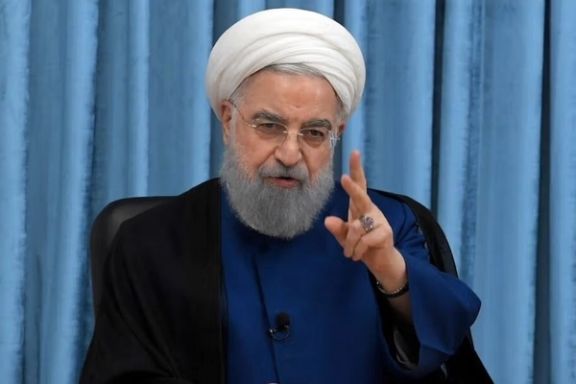
Former Iranian President Hassan Rouhani on Sunday said that reducing tensions with the United States through negotiations was a matter of national interest.

Former Iranian President Hassan Rouhani on Sunday said that reducing tensions with the United States through negotiations was a matter of national interest.
“Relations with Europe, our neighbors, and the East and the West, even tension with the US, if we can reduce it, if it is in our national interest, what is wrong with that? Not only is it not wrong, but it is also our duty and obligation,” Iranian media quoted Rouhani as saying in a meeting with his advisers on Sunday.
“We must strengthen our relations with the world. Whoever is ready to negotiate, if we see that negotiation benefits the country, our national interests and national security, then we should talk,” he added.
Rouhani, who served as president when Iran signed the 2015 nuclear deal with world powers, had described negotiations with the US as “necessary and obligatory” in an earlier meeting with his advisers on August 14.
His remarks come after Iran’s Supreme Leader Ali Khamenei rejected calls by Tehran moderates for direct negotiations with the United States, insisting that Washington’s hostility cannot be resolved through talks.
“Those who say, ‘Why don’t you negotiate directly with the United States and solve the issues,’ are superficial; because the reality is different," Khamenei said during a meeting with his supporters in Tehran.
"Given America’s true objective in its hostility toward Iran, these issues are unsolvable."
Iran and the United States concluded five rounds of mostly indirect talks in May this year.
A sixth round was scheduled to take place on June 15 in Oman. However, it was suspended after Israeli airstrikes on Iran’s nuclear facilities on June 13, prompting Tehran to declare the talks "meaningless" and cancel the session.
On June 22, the US carried out airstrikes on Iran’s key nuclear sites at Fordow, Natanz, and Isfahan. A US-brokered ceasefire came into effect on June 24, which ended the 12-day air war.
President Trump told reporters in mid-July that the urgency to engage with Iran had vanished after US strikes.
Earlier, Iran International reported that Washington ignored at least 15 messages from Iran seeking renewed negotiations.

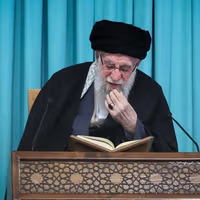
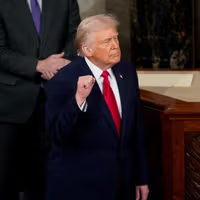
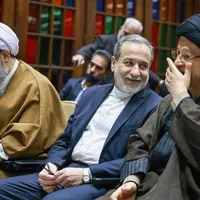



The United States will ensure that foreign visitors pose no threat to its national security, the State Department told Iran International when asked whether the Iranian delegation would be issued visas to attend this year's UN General Assembly in New York.
While the United States is generally obligated under the UN Headquarters Agreement to issue visas to representatives of member states, the Trump administration "will not waver in upholding American law and the highest standards of national security and public safety in the conduct of our visa process," a State Department spokesman said.
"Ensuring that foreign visitors to the United States do not pose a threat to US national security or public safety remains a paramount priority of the US government," the spokesperson added in response to Iran International's inquiry.
The State Department said it does not comment or speculate on individual cases due to visa confidentiality, leaving it unclear whether Iranian officials will be allowed to travel to New York this year.
The comments come as the United Nations prepares to host its annual General Assembly session next month, when world leaders gather in New York for high-level meetings.
Secretary of State Marco Rubio rescinded the visas of Palestinian President Mahmoud Abbas and 80 other officials ahead of the UN General Assembly, the State Department said on Friday, though Palestinian representatives assigned to the UN mission were granted exceptions.
Visa for Iranian officials
Last year, the United States faced criticism from members of the Iranian diaspora and activists over its decision to issue visas to President Masoud Pezeshkian and his delegation to attend the UNGA.
The question of visas for Iranian delegations to the UN has been a recurring point of friction between Washington and Tehran, particularly during President Donald Trump’s previous term.
In 2019, Foreign Minister Mohammad Javad Zarif was granted a visa to attend the UNGA in New York, but his movements were tightly restricted to a few blocks around UN headquarters.
The US also has a history of denying visas to officials of the Islamic Republic. In 2014, the White House refused to issue a visa to Iran’s nominee for UN ambassador, Hamid Aboutalebi, due to his involvement in the 1979 seizure of the US embassy in Tehran.
More than 100 prisoners accused of spying for Israel are facing imminent execution in Iran after the bombing of Tehran’s Evin prison in June, lawyers and survivors told The Sunday Times.
The judiciary has accelerated death sentences since Israel struck the prison on June 23.
Human rights lawyers said the attack gave judges a pretext for vengeance.
“A spirit of vengeance has taken over the judiciary,” one Tehran lawyer, who asked not to be named, told the Times.
“A judge told me: ‘Our generals and officials have been killed, and we should take revenge.’ He didn’t even allow me to speak.”
Motahareh Gounei, a 28-year-old dental student arrested for criticizing the state, survived the bombing in Ward 209. “I thought, ‘This is it. I’m dead. I’ll be buried here,’” she said in a phone interview after being released on bail.
Rights groups say many of those now marked for execution were jailed for protest activity, not espionage, and their cases rest on confessions extracted under torture.
Asghar Jahangir, spokesperson for the Islamic Republic’s judiciary, announced on June 29 that in the Israeli attack on Evin Prison, 71 people were killed.
“The casualties included administrative staff, soldiers, inmates, family members who had come for visits or legal follow-ups, and neighbors living near the prison,” he said.
From ‘Evin University’ to collective punishment
Evin has long been notorious for torture yet also carried symbolic weight for the opposition. Political detainees staged hunger strikes, organized discussions and even confronted judges visiting the prison. It became known among activists as Evin University.
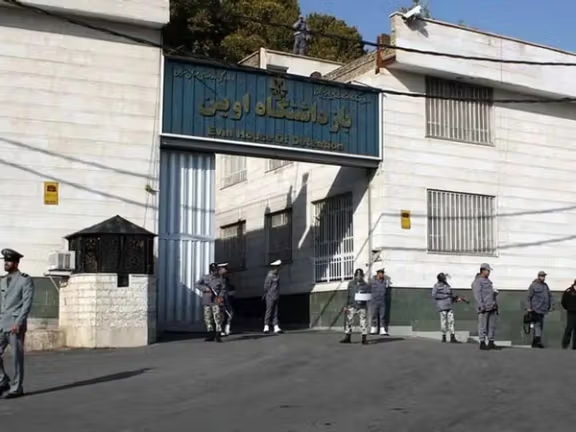
That fragile space was erased by the airstrike. The following day, authorities transferred 61 women to Qarchak, a facility notorious for disease and overcrowding.
“Since we were transferred to Qarchak, we’ve lost the right to work in workshops and to cover our living expenses. That means we can no longer buy groceries and are forced to eat the prison’s food, which is mostly plain rice,” one inmate said in a monitored call.
Gounei was later moved to an intelligence-run safe house. “Your name isn’t recorded anywhere,” she said. “My interrogator told me: ‘I’ll rape you and dump your body in the desert.’”
Rising executions
Iran Human Rights, an NGO, recorded 511 executions in the first five months of 2025, nearly double the same period last year. The judiciary has announced 700 arrests for alleged espionage during the war, vowing to show “no mercy.”
Male inmates from Evin have also faced brutality. About 500 transferred prisoners were returned in chains and beaten by riot police. Roughly 100 condemned prisoners were separated from the rest, including Mohammad-Bagher Bakhtiar, a 67-year-old former Revolutionary Guard commander turned dissident.
His son, Ali Reza, said: “Since the transfer to Evin, due to lack of access to medical staff, the full extent of the injuries to my father and other detainees is still unknown.”
Israel said its strikes on Evin aimed at guards and were designed to embolden the opposition. Officials accused Tehran of exploiting the attack to justify executions while presenting the war as a domestic victory.
Iran expelled more than 1.8 million undocumented migrants who are mainly Afghans over the past year, an interior ministry official said on Sunday, adding that at least 800,000 more must leave under the government’s removal plan.
The program began with classifying migrants into legal and illegal groups to provide services to the former and facilitate the return of the latter, Nader Yarahmadi, Head of the Interior Ministry’s Center for Foreign Nationals and Migrants.
“From the total 1,833,636 undocumented migrants who left, 1.2 million departures occurred this year alone,” Yarahmadi said.
“More than 70 percent of these undocumented migrants went back home with their families,” he said.
Yarahmadi added that the expulsions are not over. “At least 800,000 more people must be removed as undocumented migrants, which is on the agenda in the next phases,” he said.
Crackdown after ceasefire with Israel
Iran launched a sweeping crackdown on Afghan migrants in the wake of a ceasefire with Israel, targeting them for deportation and alleged security threats.
Taliban authorities have warned of a looming humanitarian crisis in western Afghanistan due to the rapid influx.
Over the decades, Afghan migrants have been treated as expendable tools in Tehran’s shifting policies in the region. They were recruited to fight in Syria as part of the Fatemiyoun Brigade, exploited as cheap undocumented labor inside Iran, and periodically threatened with mass expulsion in bouts of official populism. During moments of domestic discontent, Afghan migrants became convenient targets to deflect public anger.
Following the Taliban’s return to power in 2021, a massive influx of Afghan refugees entered Iran and as many as two million Afghans crossed the border within two years.
Rather than developing a comprehensive migration policy, authorities allowed border regions to turn into chaotic transit points run by smugglers and corrupt officials.
Officials insist the expulsions will continue until the number of foreign residents matches what they describe as the country’s designed capacity.
President Donald Trump ordered airstrikes on Iran’s nuclear sites in June without alerting US diplomats, leaving them unable to answer questions from foreign governments, the Wall Street Journal reported on Sunday.
Officials from Middle East countries pressed for answers after the strikes, but US embassies could only point to Trump’s public remarks, the Journal said, citing people involved in the talks.
The report said Trump has sidelined the National Security Council, slashed staff to under 150, and merged key roles. Secretary of State Marco Rubio now also serves as national security adviser.
“It is a top-down approach,” White House press secretary Karoline Leavitt told the Journal. “We don’t really care if your feelings are hurt. We just need to get a job done.”
“In many respects, the national security process has ceased to exist,” said David Rothkopf, a historian of the NSC. Trump, he added, effectively is the national-security system—“the State Department and the Joint Chiefs and the NSC all rolled into one.”
Some aides say the system cuts leaks and speeds decisions. Others warn it leads to confusion and leaves officials guessing what Trump wants.
'Every bomb hit its target'
The US struck nuclear sites at Fordow, Natanz and Isfahan using B-2 bombers and submarine-launched missiles. Trump later confirmed the use of 30,000-pound bunker-busting bombs that entered Iran’s underground facilities through ventilation shafts.
“They went right down those chutes,” Trump said. “Dark at night, no moon, no nothing. Every target, every bomb went right down.”
The operation, called Operation Midnight Hammer, was carried out with long-range aircraft and 52 aerial refueling tankers. General Dan Caine, chairman of the Joint Chiefs of Staff, said 14 Massive Ordnance Penetrators were used against Fordow and Natanz.
Iran tried to restart talks, got no answer
In the weeks after the strikes, Iranian officials said Tehran sent at least 15 messages to the US through various channels seeking to resume talks but received no reply, Iran International reported, citing senior diplomats.
European powers triggered the UN’s snapback sanctions process, citing Iran’s nuclear activity, and said US-Iran dialogue was key to delaying new penalties.
Trump told reporters in July he was in “no rush” to talk. “They would like to talk. I’m in no rush because we obliterated their site,” he said.
Iran’s top leaders remain opposed to direct talks. “Given America’s true objective in its hostility toward Iran, these issues are unsolvable,” Supreme Leader Ali Khamenei said this month.
Senior Iranian officials have admitted in private meetings that Washington ignored at least 15 messages from Iran seeking renewed negotiations, Iran International has learned, as Tehran scrambles to head off the reimposition of UN sanctions.
Deputy foreign minister for political affairs Majid Takht-Ravanchi told editors of Iranian print and online media in a private meeting Saturday that the White House had disregarded Tehran’s messages about resuming negotiations, according to information obtained by Iran International.
In a similar session last week, deputy foreign minister for legal affairs Kazem Gharibabadi revealed that Iran had sent messages to Washington 15 times through different channels but had received no reply.
Britain, France and Germany on Thursday triggered a 30-day process - the so-called 'snapback' mechanism - to reimpose UN sanctions on Iran over its nuclear program in a formal letter sent to the UN Security Council.
Resumption of talks with the US is one of the three preconditions set by the Europeans for delaying the snapback of UN sanctions on Iran.
During previous talks with the US brokered by Oman, Iran refused to accept limits on its uranium enrichment program. US special envoy Steve Witkoff presented proposals after several rounds, but they were all rejected as Supreme Leader Ali Khamenei insisted that enrichment inside Iran was a red line.
The Trump administration had set a 60-day deadline to secure a nuclear agreement with Iran. On day 61 or June 13, with four rounds of negotiations completed and a fifth looming, Israel launched a surprise military attack on Iran.
After the conflict, Washington declared that a deal was possible only if Iran agreed to “zero enrichment” on its soil, a condition Iranian officials continue to reject.
US in no rush for talks
President Trump told reporters in mid-July that the urgency to engage with Iran had vanished after US strikes.
“They would like to talk. I’m in no rush to talk because we obliterated their site,” Trump told reporters, implying he was content to let pressure build.
Iran's First Vice President Mohammad Reza Aref said on August 12 that Iran was ready for direct talks with the US “under the right conditions” to preserve mutual interests, but his remarks were quickly dismissed by Khamenei.
On August 24, the Supreme Leader again attacked advocates of direct negotiations, describing America’s enmity as “unsolvable.”
“Those who say, ‘Why don’t you negotiate directly with the United States and solve the issues,’ are superficial; because the reality is different," Khamenei said during a meeting with his supporters in Tehran.
"Given America’s true objective in its hostility toward Iran, these issues are unsolvable."